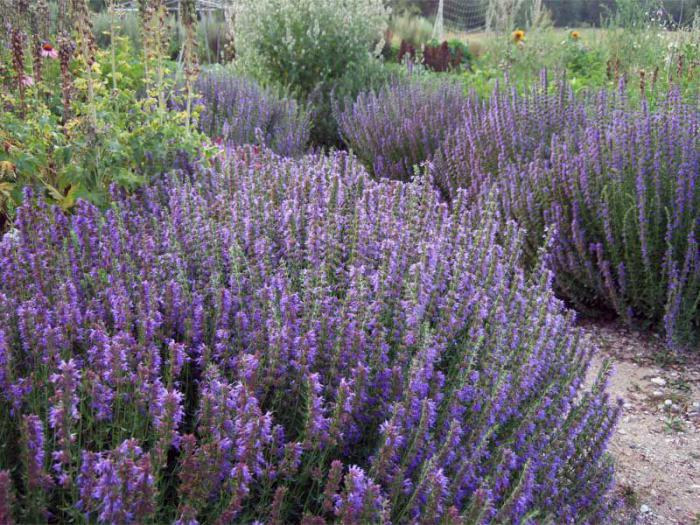|
In America, an infusion of the leaves is used externally for the relief of muscular rheumatism, and also for bruises and discoloured contusions, and the green herb, bruised and applied, will heal cuts promptly.
The infusion has an agreeable flavour and is used by herbalists in pulmonary diseases. It was once much employed as a carminative in flatulence and hysterical complaints, but is now seldom employed. A tea made with the fresh green tops, and drunk several times daily, is one of the oldfashioned country remedies for rheumatism that is still employed. Hyssop baths have also been recommended as part of the cure, but the quantity used would need to be considerable. |
Hyssop
Sub-shrub, 2-4 feet, but does not attain more than
2 feet in cold parts. Can be raised either from seed or cuttings. Sow seed in drills a quarter of an inch deep and plant out seedlings 2 feet apart. Take cuttings in spring or after the plants have ceased flowering in autumn. Strike in sandy soil and plant out the following season. The type has blue flowers. (The pink- and white- flowered varieties have to be raised from cuttings as they do not come true from seed.) Hyssop is a name of Greek origin. The Hyssopos of Dioscorides was named from azob (a holy herb), because it was used for cleaning sacred places. It is alluded to in the Scriptures: 'Purge me with Hyssop, and I shall be clean.' Expectorant, diaphoretic, stimulant, pectoral, carminative. The healing virtues of the plant are due to a particular volatile oil, which is stimulative, carminative and sudorific. It admirably promotes expectoration, and in chronic catarrh its diaphoretic and stimulant properties combine to render it of especial value. It is usually given as a warm infusion, taken frequently and mixed with Horehound. Hyssop Tea is also a grateful drink, well adapted to improve the tone of a feeble stomach, being brewed with the green tops of the herb, which are sometimes boiled in soup to be given for asthma. |
- Home
- Introduction
- Choose your Plan
-
Choose your Plants
- Alecost
- Anchusa
- Angelica
- Balkan Sage
- Balm
- Basil Sweet & Bush
- Bergamot
- Borage
- Calaminth
- Camphor Plant
- Caraway
- Catmint
- Chamomile
- Chervil
- Chives
- Clary
- Comfrey
- Coriander
- Dill
- Elecampane
- Fennel
- Fennel Florence
- Feverfew
- Garlic
- Germander
- Giant Catmint
- Herb Patience
- Horehound
- Hyssop
- Lad's Love
- Lady's Maid
- Lavender
- Lily of the Valley
- Lovage
- Lungwort
- Mace
- Mallow
- Marigold
- Marjoram
- Melilot
- Mints
- Old Lady
- Parsley
- Pennyroyal
- Rose
- Rosemary
- Rue
- Sage
- Salvia Virgata Nemorosa
- Santolina Chamaecyparissus
- Savory
- Sorrel
- Sweet Cicely
- Tansy
- Tarragon
- Thyme
- Vervain
- Woad
- Wormwood
- Workshops
- Q & A
- Blog
- Contact
- Home
- Introduction
- Choose your Plan
-
Choose your Plants
- Alecost
- Anchusa
- Angelica
- Balkan Sage
- Balm
- Basil Sweet & Bush
- Bergamot
- Borage
- Calaminth
- Camphor Plant
- Caraway
- Catmint
- Chamomile
- Chervil
- Chives
- Clary
- Comfrey
- Coriander
- Dill
- Elecampane
- Fennel
- Fennel Florence
- Feverfew
- Garlic
- Germander
- Giant Catmint
- Herb Patience
- Horehound
- Hyssop
- Lad's Love
- Lady's Maid
- Lavender
- Lily of the Valley
- Lovage
- Lungwort
- Mace
- Mallow
- Marigold
- Marjoram
- Melilot
- Mints
- Old Lady
- Parsley
- Pennyroyal
- Rose
- Rosemary
- Rue
- Sage
- Salvia Virgata Nemorosa
- Santolina Chamaecyparissus
- Savory
- Sorrel
- Sweet Cicely
- Tansy
- Tarragon
- Thyme
- Vervain
- Woad
- Wormwood
- Workshops
- Q & A
- Blog
- Contact


